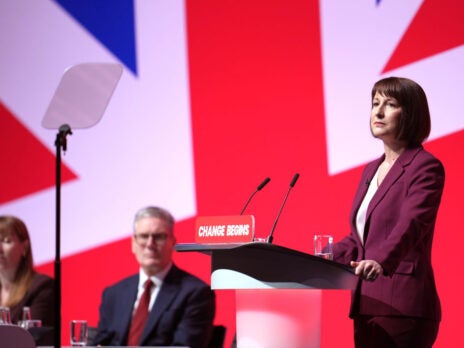
At the Labour Party’s autumn conference this year, Keir Starmer did one thing differently. He leaned in.
Not just with the new intimate public speaking technique that was on show when he gave his speech, repeatedly inclining forward and dropping his voice almost to a whisper. The Labour leader was also leaning in to his image as “boring” (In June the Guardian reported that he had to tell shadow cabinet members to stop describing him that way, saying that “what’s boring is being in opposition”).
Instead of making Love Island jokes, as he tried to do in one of his less convincing Prime Minister’s Questions performances amid accusations of dullness, Starmer changed tack. Opening his leader’s speech with an Arsenal joke, and going misty-eyed over his family’s Ford Cortina and pebble-dashed semi, he channelled the image of a “basic dad”, as I’ve heard some in the Labour movement describe him. John McTernan, the political strategist and former adviser to Tony Blair, wrote recently that “he loves football, supports Arsenal and is a nifty five-a-side player himself. And… he likes a beer. Get that across. And repeat it”.
Starmer was making a virtue of his boringness, telling the Today programme the most exciting thing about him was when he had his two children – and “if people think that’s boring, I don’t care… If I came on and said I’d done a bungee jump, you wouldn’t say, ‘Great, now we’ve got the prime minister we need’.”
In fact, even people who voted Labour in 2019 think he is “boring”, according to exclusive polling for the New Statesman by Redfield & Wilton Strategies*. The largest portion of Labour voters, 38 per cent, say Starmer is “boring” (three points higher than in June) while 27 per cent neither agree nor disagree that he is, 34 per cent disagree and 2 per cent don’t know.
Yet this is apparently no bad thing as Labour voters also appear to identify with Starmer. When asked where they saw the Labour leader in comparison with their own politics, the largest share, 35 per cent, chose “just as left-wing as I am”. A quarter said “less left-wing than I am”, 14 per cent “more left-wing than I am” and 26 per cent still didn’t know. As Starmer has spent much of his leadership putting Labour in the centre-ground of British politics, it is notable that this is not switching off existing Labour voters, who still generally categorise him as on their version of the left.
The Labour leader also quoted Tony Blair during his conference speech, calling his party the “political wing of the British people”. Channelling the New Labour prime minister appears also to have cut through to Labour voters.
When asked to which previous Labour leader Starmer’s political ideology is most similar, a quarter chose Tony Blair, 16 per cent Gordon Brown, 12 per cent Jeremy Corbyn and 9 per cent Ed Miliband (12 per cent said none, and a notable quarter didn’t know). While Starmer’s policies, particularly on energy, reflect more of a Miliband-esque agenda, it’s clear his stylistic and rhetorical choices are evoking a different, more electorally successful Labour era.
Even the fact that a lot of people haven’t yet made their mind up about him suggests an ambiguity that fits with the middle-of-the-road image he’s trying to cultivate.
*Polling of 2,500 voters in Great Britain who voted Labour in 2019, carried out on 28-29 September.
[See also: Tactical voting could leave Tories with just eight northern seats]


